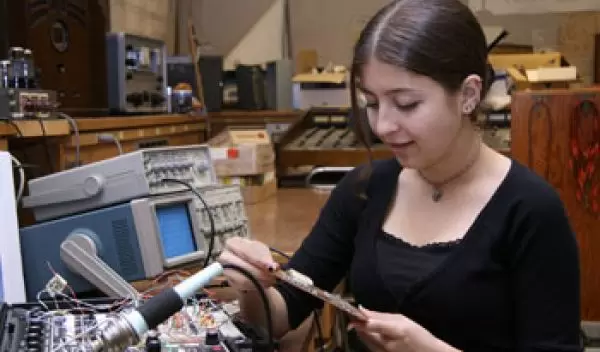
CalWomenTech Scale Up Project: Proven Tools Attract Women to STEM Training Programs
In his 2012 State of the Union address, President Barak Obama highlighted the importance of community colleges to strengthen the U.S. workforce.
He introduced Jackie Bray, a single mother from North Carolina, who was laid off from her job as a mechanic. Through a partnership between Siemens and Central Piedmont Community College, Bray was retrained in lasers and robotics and went to work for Siemens at a new gas turbine factory in Charlotte.
Encouraging more women to choose career paths that provide higher wages and growth potential is at the heart of a unique program funded by the National Science Foundation (NSF).
The CalWomenTech Scale Up Project builds on the highly successful CalWomenTech Project, also funded by NSF, that increased the number of female students in science, technology, engineering and mathematics (STEM) programs at eight community colleges in California.
The City College of San Francisco, for instance, boosted enrollment of female students in computer networking and information technology courses from 19 percent in 2007 to 33 percent a year later.
To improve recruitment, the CalWomenTech Project focused on finding female role models in STEM careers and using their images on posters, brochures, flyers and websites promoting STEM programs at each school.
The project also trained community college faculty and staff in designing career development events that would attract women using social media to spread the news about STEM course offerings and create strategies to capture media attention for their events.
Retention strategies included ensuring students have basic math skills required for STEM courses, training faculty to understand female learning styles and adjusting the curriculum so that it includes more examples that appeal to women.
The Scale Up Project expands the work of the CalWomenTech project by disseminating it to members of NSF's Advanced Technology Education (ATE) network--39 centers located at community colleges around the country that prepare students to become highly skilled technicians in such fields as advanced manufacturing, photonics, biotechnology, nanotechnology and cybersecurity.
While ATE centers actively engage in efforts to attract female students, a study by ATE's Evaluation Resource Center shows that between 2000 and 2009 the average percentage of women in ATE-funded programs dropped from 41 percent to 32 percent.
"There is an unmet need [within this community]," says Donna Milgram, principal investigator of both CalWomenTech projects. "Developing a recruitment and retention campaign is not difficult to do but it's not what educators in this [STEM] arena are set up to do."
The Scale Up project will provide ATE centers with:
- Online and in-person training in recruitment and retention of women in STEM programs,
- Webinars on specialized topics such as evaluating gender data in ATE programs,
- A collection of proven practices to recruit and retain women available through ATECentral.net--an online portal of resources for the ATE community,
- Strategies for social media outreach,
- Customizable marketing materials, and
- Presentations at STEM professional conferences.
Central to the project is the ten-week, online training program which is based on Milgram's successful in-person recruitment and retention training developed over her 17 years as the director of the Institute for Women in Trades, Technology and Science (IWITTS).
The program guides participants step-by-step through development of a recruitment and retention plan tailored for the needs of each center or school. Participants also receive assistance through an interactive online community and six months of follow-up support to assist with implementation.
Milgram notes that the invitation to the Scale Up Project's first online training session was so popular--106 educators applied for the 25 available slots--that she added four additional spaces.
One of the most encouraging aspects of the online training program is the interactive online community. "Everyone in the training is interacting with each other and giving positive feedback on the learning modules," says Milgram.
Although in-person training programs often involve a lot of interactive group work, the time spent on activities is often limited. "When you do things online, people get to go into more depth because they have more time to work on each module," says Milgram. "We can increase capacity and reach out and touch more people with this information."
Milgram works closely with co-principal investigator Gordon Snyder, director of the Information and Communications Technology Center at Springfield Technical Community College in Massachusetts and chair of the project's national advisory committee, to ensure the training program addresses the needs of the ATE community and is disseminated as widely as possible.
The Scale Up Project--funded jointly by NSF's ATE program and the Research on Gender in Science and Engineering program--will also reach out to the wider community college community through online resources, social media and professional conferences.
Developing a recruitment campaign that includes female role models is critical to improving enrollment numbers for women, says Milgram.
"STEM jobs are not on women's radar screens because they don't see women in these jobs. We need ways for women to see other women in these jobs. We need to send a strong message. If women are not in the picture it's a missed opportunity in STEM fields."


